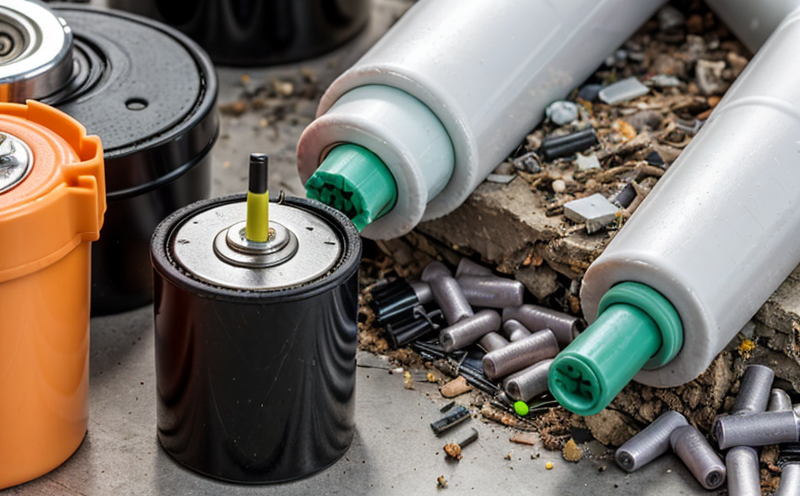UL 2271 Recycling Testing of Light Electric Vehicle Batteries
The UL 2271 standard is a critical framework that addresses the safety and environmental impacts associated with the recycling of lithium-ion batteries from light electric vehicles (LEVs). This service ensures that end-of-life batteries are processed in an environmentally responsible manner, reducing the risk of hazardous materials entering the waste stream. Our laboratory is equipped to conduct comprehensive testing according to UL 2271, ensuring compliance and safety for all stakeholders involved.
Light electric vehicles encompass a variety of transportation modes including e-scooters, e-bikes, and other personal mobility devices that use lithium-ion batteries. These batteries are not only critical for the performance of these vehicles but also pose significant risks if improperly recycled or disposed of. UL 2271 provides stringent guidelines to ensure that recycling processes do not release harmful substances into the environment.
The testing process begins with thorough documentation and sample preparation, ensuring that each battery is representative of its type. Our team uses advanced analytical techniques such as X-ray fluorescence (XRF) spectroscopy for elemental analysis, inductively coupled plasma mass spectrometry (ICP-MS), and gas chromatography-mass spectrometry (GC-MS) to identify trace elements and contaminants that may pose environmental risks.
UL 2271 requires the testing of several key parameters including but not limited to temperature, pressure, and chemical composition. These tests are conducted in controlled environments to ensure accurate results. Our laboratory adheres strictly to these standards, providing detailed reports that include all test data and compliance status.
Our UL 2271 recycling testing service is designed to assist manufacturers, recyclers, and other stakeholders in meeting regulatory requirements while minimizing environmental impact. By ensuring strict adherence to UL 2271, we help companies navigate the complex landscape of battery recycling regulations, enhancing their reputation for sustainability.
| Standard | Description |
|---|---|
| UL 2271-2023 | Safety Standard for Recycling of Lithium-Ion Batteries from Light Electric Vehicles. |
| ISO 15986:2022 | Environmental Management Systems - Requirements with Guidance for Use. |
| ASTM D7431-21 | Standard Guide for Characterization of Recycled Lithium-Ion Battery Materials. |
Applied Standards
- UL 2271-2023: Safety Standard for Recycling of Lithium-Ion Batteries from Light Electric Vehicles.
- ISO 15986:2022: Environmental Management Systems - Requirements with Guidance for Use.
- ASTM D7431-21: Standard Guide for Characterization of Recycled Lithium-Ion Battery Materials.
Eurolab Advantages
At Eurolab, our commitment to excellence in testing and certification is unparalleled. With state-of-the-art facilities, expert technicians, and a deep understanding of the regulatory landscape, we ensure that every test conducted meets or exceeds international standards.
We offer a full suite of services tailored specifically for battery recycling, including UL 2271 compliance testing. Our team works closely with clients to understand their unique needs and challenges, providing customized solutions that fit seamlessly into their operations.
In addition to our technical expertise, Eurolab is dedicated to fostering innovation within the industry by staying at the forefront of technological advancements. We continuously invest in new equipment and methodologies to provide accurate, reliable results that are trusted worldwide.
Our clients benefit from our comprehensive approach, which includes not only testing but also consultation services aimed at helping businesses navigate regulatory requirements efficiently. By partnering with Eurolab, companies can ensure they remain compliant while minimizing environmental impact.
Customer Impact and Satisfaction
- Ensures compliance with UL 2271, reducing environmental impact of battery recycling.
- Provides detailed reports that enhance transparency and trust within the industry.
- Helps clients navigate complex regulatory requirements efficiently.
- Improves overall sustainability practices by minimizing hazardous waste disposal.





